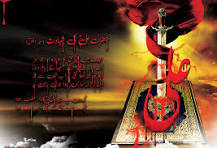By Ahsan Ansari
Hazrat Ali (RA) is a shining personality in Islam who set unparalleled examples of upholding the faith, justice, bravery, and wisdom—examples that will remain forever. He was not only the fourth Caliph of the Rightly Guided Caliphs but also the cousin, son-in-law, and a highly esteemed companion of the Prophet Muhammad (PBUH). His martyrdom is one of the most tragic events in Islamic history, which took place on the 21st of Ramadan in the year 40 AH.
During Hazrat Ali’s (RA) caliphate, the Muslim Ummah faced numerous internal and external challenges. After the martyrdom of Hazrat Uthman (RA), divisions among Muslims intensified, and these conflicts posed significant challenges during Hazrat Ali’s (RA) rule. When he assumed the caliphate in 35 AH, he encountered opposition from various factions, the most severe being from the Khawarij. These were people who were displeased with the arbitration (Tahkim) decision between Hazrat Ali (RA) and Ameer Muawiya (RA) during the Battle of Siffin. They believed that only Allah had the right to decide leadership matters and that human decisions were invalid. Consequently, they blamed Hazrat Ali (RA) and rebelled against him.
Three members of the Khawarij—Abdul Rahman bin Muljam, Barak bin Abdullah, and Amr bin Bakr—plotted to assassinate Hazrat Ali (RA), Ameer Muawiya (RA), and Amr bin Aas (RA) on the same night, believing this would end the ongoing conflicts within the Ummah. Abdul Rahman bin Muljam was tasked with killing Hazrat Ali (RA). He traveled to Kufa, where he met a woman named Qatama, who held a deep grudge against Hazrat Ali (RA) as her relatives had been killed in the Battle of Nahrawan. She further incited bin Muljam, strengthening the conspiracy against Hazrat Ali (RA).
On the 19th of Ramadan 40 AH, Hazrat Ali (RA) proceeded as usual to Masjid-e-Kufa for the Fajr prayer. As he went into sujood (prostration), Ibn Muljam struck his head with a poisoned sword. Upon receiving the blow, Hazrat Ali (RA) uttered the words:
“Fuztu wa Rabbil Ka’bah” (“By the Lord of the Ka’bah, I have succeeded!”)
These words signified that Hazrat Ali (RA) saw his martyrdom as his ultimate success, as his entire life had been dedicated to justice, knowledge, piety, and jihad. He was taken home in a wounded state, where his condition worsened over the next two days. Realizing that his time was near, he advised his sons Hazrat Hasan (RA) and Hazrat Hussain (RA) to remain steadfast on the path of faith, uphold justice, and treat even their enemies in accordance with Islamic principles. He instructed that if he survived, he would decide his course of action, but if he attained martyrdom, his assassin should be punished with only one strike—no more, as Islam does not permit excess. On the 21st of Ramadan 40 AH, Hazrat Ali (RA) embraced martyrdom.
He was laid to rest near Najaf, Kufa, where his blessed shrine still stands today. Pilgrims from around the world visit to pay their respects. His martyrdom left an immense void in the Islamic world. The caliphate then passed into the hands of the Umayyads, marking the end of the Rashidun Caliphate. His martyrdom was not merely the loss of a ruler but the loss of an icon of justice, knowledge, and bravery, whose influence remains to this day.
Hazrat Ali (RA) was a fearless commander, an exceptional judge, a great scholar, and a deeply pious man. His justice was unmatched. He once said: “A government can survive with disbelief, but not with oppression.”
His sayings are full of wisdom, such as:
“A person without intellect has nothing.”
His bravery in battles such as Badr, Uhud, Khaybar, and Khandaq is a golden chapter in Islamic history. His devotion to worship was profound, earning him the title of Imam-ul-Muttaqeen (Leader of the Pious).
The martyrdom of Hazrat Ali (RA) is a chapter in Islamic history that can never be forgotten. He spent his entire life striving for Islam, truth, and justice, ultimately giving his life in the same cause. His teachings and character remain a great model for every Muslim and leader. If today’s rulers were to adopt Hazrat Ali’s (RA) principles of justice, courage, and wisdom, the world could achieve a system of peace and fairness.
May Allah grant us the ability to learn from the life of Hazrat Ali (RA) and follow his teachings. Ameen!




